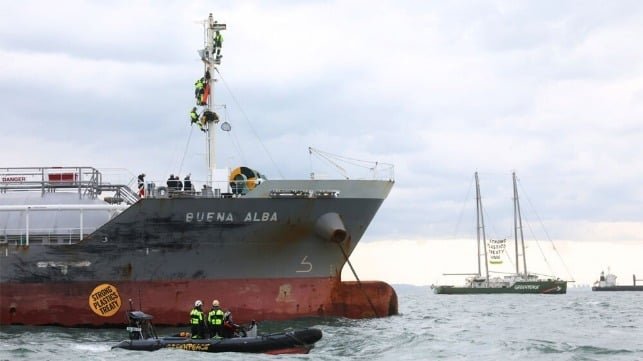The Trial of Greenpeace Activists in South Korea
The captain of Greenpeace’s vessel Rainbow Warrior and four activists faced their first court appearance in South Korea on Friday, May 16. The charges stemmed from a 2024 incident where they boarded a Japanese-owned LPG tanker anchored off South Korea. Their detention in the country since November was related to a protest calling for a strong international plastics treaty ban.
The protest coincided with the fifth round of negotiations for a UN Global Plastic Treaty in Busan, South Korea. Greenpeace’s Rainbow Warrior was on a “Sailing for Change” tour in Eastern Asia and had planned a visit during the negotiations.
On November 30, the activists set off from the mother ship, displaying banners advocating for the treaty and painting “Plastics Kill” on the Panama-registered LPG tanker Buena Alba. Climbing the ship’s mast, they unfurled their banners, aiming to draw attention to their cause.
Greenpeace’s activists atop the mast of the LPG tanker (Greenpeace)
Greenpeace maintained that the protest was peaceful and did not endanger anyone, stating that the tanker was waiting to load chemicals at the Hyundai Daesan Refinery.
Following the incident, South Korean police detained the activists and the Rainbow Warrior captain for nearly two days. Although released, they were ordered to remain in South Korea pending the investigation outcome.
Today, they appeared in the Seoul Central District Court for their initial hearing, facing charges of obstruction of business and unlawful intrusion onto a vessel. The court imposed travel restrictions on the five individuals.
Outside the court, Greenpeace staged a protest urging the release of its members to reunite with their families and for a swift trial conclusion, reiterating their call for the Plastics Treaty.
Legal History
This incident adds to Greenpeace’s history of legal encounters involving ships. In September 2024, a Danish court fined the group for obstructing tankers linked to Russian oil trade in Danish waters. Additionally, Greenpeace settled with Shell in December after activists boarded an oil platform being transported to the North Sea. The agreement included a donation to the RNLI and a commitment to avoid Shell sites in the North Sea for several years.

